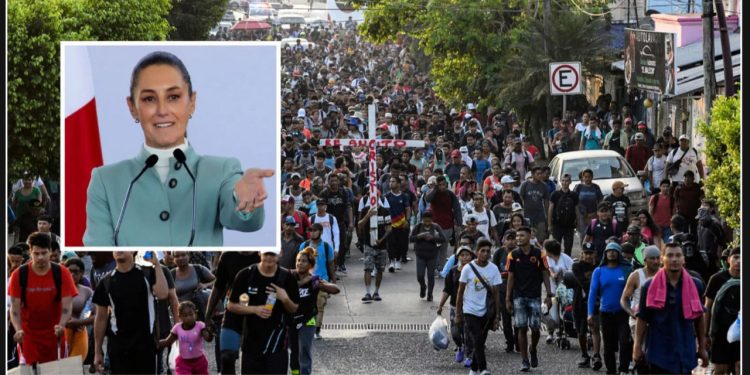Mexican President Claudia Sheinbaum responded to renewed threats of steep tariffs from U.S. President-elect Donald Trump this week, confidently stating that migrant caravans are no longer able to reach the U.S.-Mexico border.
Her remarks highlight the increasing tensions surrounding Trump’s intentions to tighten immigration policies and impose a 25 percent tariff on Mexican imports. Trump firmly stated that these tariffs would continue until there is a halt to the influx of drugs, particularly Fentanyl, and all illegal immigrants that he perceives as invading the country.
During a presentation on Tuesday, Sheinbaum made a statement asserting that caravans of migrants no longer make it to the border. She also mentioned her intention of sending a letter to Trump in the near future. In addition, she highlighted Mexico’s ongoing efforts to combat drug trafficking, particularly the synthetic opioid fentanyl. She acknowledged that drug abuse is a public health issue within the United States.
With Trump’s second inauguration on the horizon, his strong stance on immigration has once again come to the forefront. This comes at a time when a caravan of around 1,500 migrants from Central and South America is making its way towards the U.S. border, all before Trump’s proposed policies go into effect.
The urgency to address this issue is driven in part by Trump’s pledge to dismantle programs like the CBP One app, which enables migrants to schedule asylum appointments remotely. Nonetheless, Sheinbaum emphasized that Mexico should not be held responsible for the arrival of these caravans at the border.
According to the speaker, President Trump may not be aware of the fact that a large number of people arriving at the border have a CBP One appointment. It is worth mentioning that the number of border arrivals has decreased significantly by 75 percent compared to December 2023. Furthermore, the speaker emphasizes that it is the United States who is extending the invitation for these individuals to come to the country.
Mexico’s proactive role in addressing migration was highlighted by Sheinbaum, who also criticized the U.S. for its failure to tackle the root causes. She emphasized that if a portion of the funds allocated for war were redirected towards peace and development, it would effectively address the underlying reasons behind migration. Sheinbaum advocated for regional investment as a more constructive approach rather than relying on punitive measures.
Sheinbaum expressed concerns about tariffs and suggested that Mexico might retaliate. She emphasized that imposing one tariff could lead to another, creating a cycle of escalation that could potentially harm businesses on both sides of the border. She specifically mentioned U.S. automakers with manufacturing plants in Mexico as examples.
Canadian Prime Minister Justin Trudeau had a “good” call with President-elect Trump on Tuesday, following Trump’s threat to impose 25 percent tariffs on Canada. Trudeau expressed confidence in the potential for the U.S. and Canada to collaboratively address their differences in constructive ways.
However, there are significant obstacles to Trump’s threat. The U.S.-Mexico-Canada Agreement (USMCA) actually prohibits member countries from imposing tariffs on each other without mutual agreement. Additionally, implementing sudden measures could create disruptions in the interconnected economies, especially in the auto industry, which heavily relies on cross-border supply chains.
“It would be unacceptable and result in inflation and job losses in both Mexico and the United States,” stated Sheinbaum. She emphasized her openness to dialogue, saying, “We anticipate having a conversation with him very soon.”
In November 2024, U.S. Customs and Border Protection (CBP) observed a notable decline in migrant encounters at the U.S.-Mexico border when compared to the previous year. During October 2024, there were around 100,000 encounters, indicating a significant 75 percent decrease from the corresponding period in 2023.


